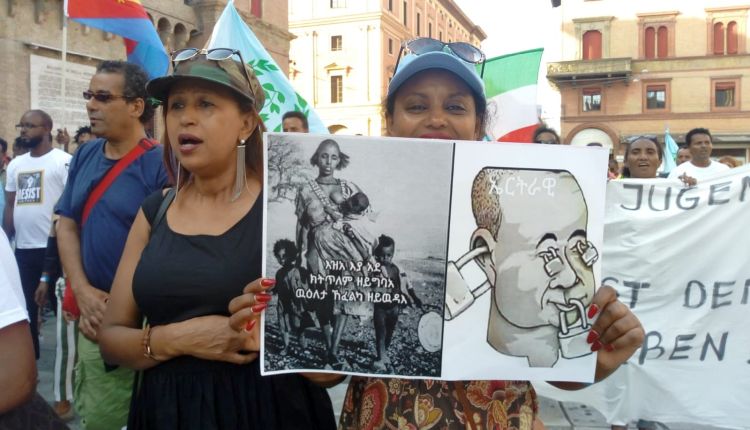Eritrea: women without rights under the dictatorship of Isaias Afewerki…

Forced into indefinite military service and raped in training centers: this is what happens to women in Eritrea, who often decide to emigrate. A journey full of abuses. And whoever gets caught leaving is arrested for “illicit abandonment of one's homeland”. And tortured in prison.
Psychological violence, rapes, torture. The situation of women in Eritrea is constantly worsening under the dictatorship of Isaias Afewerki, that from 1993 paralyzes the country. even if at first the prosecutor had asked for the investigation to be closed, indefinite military service involves people of all ages, from the girls of 15 years up to women's 50. In training centers, some of them suffer torture and violations.
«Military service begins with a training period ", explains Dania Avallone, president of Asper, association for the protection of the rights of the Eritrean people. «Officially it should last two years, after which, however, people are not let go and are exploited to work for the state without a salary: they often build buildings or farm the land. It is labor at no cost. Military service thus becomes a state of slavery ". Young women often end up becoming the sex slaves of the military, the elderly their servants.
Women who leave Eritrea risk abuse and violence
Given the situation inside the country, many women try to emigrate. During the trip, they are in a state of greater vulnerability than men: many of them are abused and sometimes end up carrying on unwanted pregnancies.
When they leave, these women are aware of the risks they face, but their situation is so desperate that they still choose to leave: to prevent the consequences of violence, some of them get slow-release hormone injections, that make them sterile sometimes for years. Once you arrive in Europe, There is always a more unhappy and more ignored victim, some are exploited or forced into prostitution to repay the cost of the trip.
«I have seen many Eritrean women who arrive in Italy with health problems, psychological and social of all kinds ", said during the recent seminar "Eritrea is a woman" Dr. Munira Alamin, general practitioner who works in Bologna. "They come to my clinic because I too am Eritrean and speak their language. Trauma comes from travel, which sometimes lasts for years, or from the violence suffered within the SEAe».
Then there are women who try to emigrate but fail, ending up being stopped at the border and arrested for "illicit abandonment of one's homeland". In prisons the situation is inhumane, as also reported by Amnesty International: the cells are often found underground, in the dark, they are overcrowded and the doors are opened once or twice a month. Even there, women often become victims of torture: they range from being left hanging upside down to being buried in the sand, from burns on the back to rape, even up to the electroshock.
The "motionless journey" of Eritrean women: photos by Cinzia Canneri
Then there are women who leave dreaming of Europe, but they do not arrive in Europe, and so they remain blocked in transit countries such as Egypt and Ethiopia. Photographer Cinzia Canneri immortalized their lives in a reportage entitled "The motionless journey of women".
“Many leave with their husbands, then the men go on and they get stuck in a country in Africa, as in limbo ", dice. «A woman's journey can also last 20 years".
Canneri tells of these "Blocked women", that he met during his reportages. Like a girl who was injured during an exercise and who therefore had great problems walking, but who in any case had not been exempted from military service and had therefore fled the country, in the hope of receiving more adequate care.
Or how a woman who had been hit by a bullet during the journey that he had punctured her kidney, that after many months she had managed to leave and is now in the United States.
But it is in Cairo that Canneri lived with women the complex emotions that precede the imminent crossing of the Mediterranean: «We felt the frenzy of arriving in Europe. There were girls who went to the pool to start getting familiar with the water. Let's not forget that many of the women who face the journey, they've never even seen the sea ".
Female fighters and independence from Ethiopia
The situation today is very different from the 1990s, when the war of independence against Ethiopia had just ended in Eritrea and there was an atmosphere of great hope. "In those years, women were highly respected", remembers Dania Avallone, who lived in Eritrea for 10 years from 1991.
"During the war, many girls had become fighters: they ate, slept, they lived together with men. There was great emancipation. Their contribution was crucial to the victory: that's why women were highly regarded ".
Also today, when it comes to female education or gender representation in politics, the situation in Eritrea is however better than in other countries: "Women have always been considered a great resource", Avallone continues. “Girls go to school like boys, there are women at the counters of public offices, as well as in the bank or post office. But talking about gender representation seems paradoxical in a country where human rights are constantly violated: there are no elections, there is no right to speak or manifestation of thought».
Violations of rights do not only involve women: men also suffer, Postcards from Ukrainian hell, seniors.
“The real problem is the dictatorship: as long as it lasts, nothing will change. All the problems stem from the political situation. That's why we ask the Italian government to take a clear position against the Afewerki regime ", concludes Avallone.